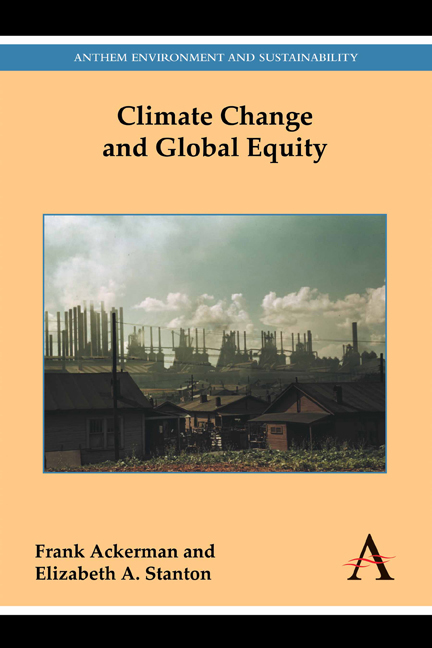Book contents
- Frontmatter
- Contents
- Introduction
- Publication History
- Part I Perspectives on Climate and Equity
- Chapter 1 Climate Economics in Four Easy Pieces
- Chapter 2 Carbon Markets Are Not Enough
- Chapter 3 Modeling Pessimism: Does Climate Stabilization Require a Failure of Development?
- Chapter 4 The Tragedy of Maldistribution: Climate, Sustainability and Equity
- Part II Analyses of Climate Damages
- Part III Theory and Methods of Integrated Assessment
- Part IV Applications of Integrated Assessment Models
- Appendix Supplementary Data for Chapter 3
- Notes
- References
Chapter 1 - Climate Economics in Four Easy Pieces
from Part I - Perspectives on Climate and Equity
Published online by Cambridge University Press: 03 November 2017
- Frontmatter
- Contents
- Introduction
- Publication History
- Part I Perspectives on Climate and Equity
- Chapter 1 Climate Economics in Four Easy Pieces
- Chapter 2 Carbon Markets Are Not Enough
- Chapter 3 Modeling Pessimism: Does Climate Stabilization Require a Failure of Development?
- Chapter 4 The Tragedy of Maldistribution: Climate, Sustainability and Equity
- Part II Analyses of Climate Damages
- Part III Theory and Methods of Integrated Assessment
- Part IV Applications of Integrated Assessment Models
- Appendix Supplementary Data for Chapter 3
- Notes
- References
Summary
Conventional economic analysis is rapidly replacing the arguments of the climate skeptics as the principal justification for inaction on climate change. It is important to create an alternative economics that is consistent with the urgency expressed by the latest climate science. This chapter presents four broad principles that are fundamental to a better analysis of climate economics. First, your grandchildren's lives are important: a low discount rate is needed to validate concern about far-future outcomes. Second, we need to buy insurance for the planet: prevention of catastrophic worst-case risks, not response to average, expected outcomes, should be the motivation for climate policy. Third, climate damages are too valuable to have prices: the impossibility of putting meaningful prices on human life, endangered species and ecosystems defeats attempts at cost–benefit analysis of climate policy. Fourth, some costs are better than others: the “costs” of active climate policies will create jobs, incomes and new technologies, while avoiding the physical destruction of the much worse costs of an increasingly extreme climate.
Introduction
Once upon a time, debates about climate policy were primarily about the science. Initially, at least in the United States, an inordinate amount of attention was focused on the handful of “climate skeptics” who challenged the scientific understanding of climate change. The influence of the skeptics, however, is rapidly fading; few people were swayed by their arguments, and doubt about the major results of climate science is no longer important in shaping public policy.
As the climate science debate is reaching closure, the climate economics debate is heating up. The controversial issue now is the fear that overly ambitious climate initiatives could hurt the economy. Economists emphasizing that fear have, in effect, replaced the climate skeptics as the intellectual enablers of inaction. For example, William Nordhaus, the US economist best known for his work on climate change, pays lip service to scientists’ calls for decisive action. He finds, however, that the “optimal” policy is a very small carbon tax that would reduce greenhouse gas emissions only 25 percent below “businessas- usual” levels by 2050 – in other words, allowing emissions to rise well above current levels by mid-century. Richard Tol, a European economist who has written widely on climate change, favors an even smaller carbon tax of just $2 per ton of carbon dioxide (Lomborg 2007).
- Type
- Chapter
- Information
- Climate Change and Global Equity , pp. 3 - 12Publisher: Anthem PressPrint publication year: 2014

